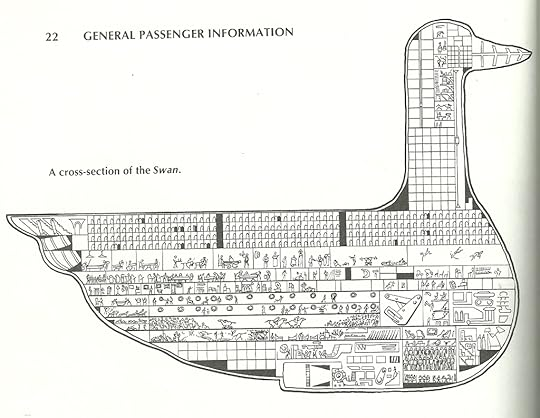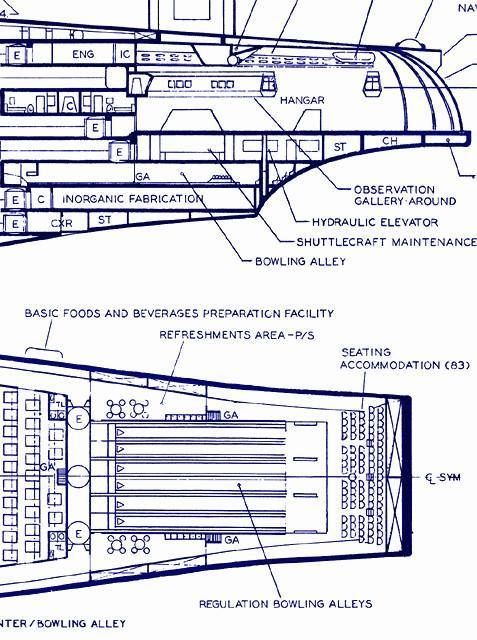In The Original Series in the 60s, people had no idea what the future would look like or what technology would look like. In one of the early episodes, they had a paper print out machine on the bridge that looked like a fax machine, which was considered futuristic in the 1960s.
Like the example of the Enterprise fax machine, what technology or system do you think are we displaying in the current Star Trek shows that will show how dated we will become in the future?
Single Use Padds:

Removed by mod
Yeah, but they do go overboard at times. There’s more than one instance where someone has a box full of PADDs with different info on each.
Yea, but that probably has more to do with replicator technology. Why interrupt your work on one PADD to check something or work on a related document “in another window” when you can replicate another one easily
I suppose, but they don’t look organized or anything in the scenes I’m talking about. I wish I could remember the episodes or even series where this has happened, but it’s happened more than once. Someone says they have to study something and they have a big, disorganized crate full of PADDs.
When I’m dealing with sets of documents, my desk doesn’t look organized. I can easily see that happening if I replaced books with PADDs.
Ah yea, but this is a post-paper world, that box of PADDs would be what would today be a box of papers and books.
Oh yea, sometimes it’s kind of over the top on the show.
My headcanon has been that many of those PADDs are 1-time use read only devices that can’t have the data copied, transferred, altered or deleted. When they’re done, they just get resynthesized. They could be for classified data, secure reports, and so on. If it’s just reading a couple duty shift reports, they are the small simple PADDs with scroll buttons. Intelligence reports on the sector, would have different levels of interactive bottoms on the sides. Potential prototype vessel upgrades, more space, more interactive features, and so on.
Alternate interpretation: Starfleet’s mobile device UI isn’t great for managing multiple documents that you quickly switch between. Everyone defaults to using multiple PADDs because they’re not going to see a major revision of LCARS anytime soon.
(Also, they’re free and easily obtained, just go to a replicator.)
because they’re not going to see a major revision of LCARS anytime soon.
I just realized the logistical support nightmare that would be. It has to support written language and cultural context for all Federation species without breaking UI/UX. It would also have to produce legible output for all those different vision systems, which could run the gamut of what’s “visible” light frequencies, contrast, brightness, and suitable magnification. Once your software engineering dream-team solves all that, you don’t change it. Ever. My head canon here is that LCARS is ugly and clunky, but is a compromise that everyone can manage to suffer through.
I find it amusing that a console featuring tangible buttons and lights with fixed positions, as seen on the original Enterprise, might actually be the better answer here.
Which would explain why TOS-era ships used those everywhere. Until they had LCARS and the matching display tech it was just easier to have everyone remember button positions.
Or it could just be a total misunderstanding of technology
Look at the size of those bevels
Bezels…?
Auto correct is dumb
Yeah, bezels. It was autocorrect, totally.
Maybe they get as annoyed as I do about fingerprints on the screen surface.
Hey, we’re getting there lol. If you count things like RFID tags (which have circuitry and microcontrollers embedded), we have plenty of disposable, single-use tech.
There is definitely lots of single use tech in use today, but I’m more referring to IPAD/Tablet like things that seem to be single use in Trek shows.
Pretty sure they used single use PADDs to bridge the meaning of paperwork to the digital age.
What for example screams being busy more? A bunch paper stacks/PADDs or just a single PADD?
I don’t think they’re single use like you’d throw them away or anything. I think they use multiple PADDs so they can hold and interact and look at multiple documents at the same time.
In a post scarcity setting, it makes sense. Sometimes I like having multiple paper documents in front of me, and that feels like the equivalent.
Having to voice commands to the computer. “Computer” will be part of the neural sync.
Also, typing anything or the use of buttons.
Also, typing anything or the use of buttons.
I think drivers of newer cars are discovering that buttons can be a good thing sometimes.
Yeah, if anything the TOS ships are more realistic in regard to their interfaces. In an emergency, when you may not have lights or gravity or whatever, buttons and knobs come with certainty. Flat, featureless touchscreens? Not so much.
They also rely on less muscle memory, which could be a problem with a touchscreen if you’re just marginally misaligned without realizing it.
You have to use your hands. Like a baby’s toy?
I think calling for the computer is the same mentally as calling for a person.
Direct-fire ship-to-ship weapons. Modern war is more and more about missiles, drones, etc. I think in the future the idea of ships coming near each-other and shooting directly will seem really old-fashioned, even if they are using space lasers.
It’s already a stupid idea and concept today.
This is some interesting thought on how space battle and interstellar war would be fought.
I’ve heard that discussion before in past forums and you are right … even ship to ship battles probably won’t exist. It will most likely be space lasers, shot from locations millions of kilometers or light years away from one another, maybe not even from a ship but from a planet or a moon or some station that never moves … a random enemy ship will just be sitting in space and BAM! they get hit without warning by a blast of radiation or weapon of some sort that came in at light speed and no warning.
The modern Star Trek theatrics of a space battle of big ships flying around one another shooting lasers and weapons will look to us how we see submarine battles in World War II
Virtually all sci-fi involving ships fighting in space uses a World War 2 aesthetic. Star Wars, especially. “Fighter” ships that fire “laser cannons” that travel in the direction of the flight of the ship is right out of how WWII fighters worked. Bigger ships with guys in turrets trying to shoot at those fighters, that’s right out of how WWII bombers like the B-17 defended themselves. Space stations or huge capital ships firing really big guns, that’s just like flak cannons in WWII.
Star Trek is a bit different especially because phasers are very fast (but not light speed). But they do ship-to-ship combat a bit like battleships shooting directly at other battleships. Sure, they have photon torpedoes, but they seem to be rarely used and they fire one at a time. And again, “torpedoes” are a very WWII weapon.
Virtually every other sci-fi show or movie does something similar: Stargate, Babylon 5 (at least they do space-inertia properly though), Farscape, Battlestar Galactica, etc. The only one that seemed a bit realistic was The Expanse, where a lot of things happened well beyond visual range, and guns were mostly about point-defense from incoming missiles.
As for what realistic distant future space combat would be like, it’s really an interesting concept. In some ways it’s like submarine combat in that there’s no horizon, things don’t need to spend energy to remain “floating” in place, and there’s essentially no chance of outmaneuvering weapons. OTOH, one of the defining features of submarine combat is stealth, and in space it’s much, much harder to hide. So, it would probably be about attempting to hide while using decoys. And, probably using remotely controlled weapons platforms that used lasers to try to smoke something detected at many light-minutes distance.
Like, instead of an armored battleship duking it out with another armored battleship, you’d probably have a command capsule that was as small and as stealthy as possible. It would communicate with scanning and weapons platforms using some kind of tech that wasn’t detectable at range, like using lasers instead of radio, or maybe even using a very long cable. But, definitely no radios because they broadcast too widely. Any active scanning would make the scanner a target, so there wouldn’t be anything valuable on the scanning source. You might even make it so that the radar / lidar emitter was separate from the receivers so that when the emitter was smoked, you didn’t lose the detectors too. Any weapons platforms would also be immediately targeted as soon as they started firing, so you’d either use a launcher that was disposable as soon as it finished launching, or a nearly disposable laser turret type thing that you’d expect to be destroyed almost as soon as it started shooting. But, I think the biggest focus would be on decoys. In the ocean you can just hide in all the background noise from the ocean. In space, you’d have to make your own background noise.
My guess is … big giant spaceships

I think that future tech will have much smaller craft or technology to move people from one star system to another.
The giant starships we highlight in the shows today will be looked at in the future in the same way we look at people in the 1900s who thought that big giant cruise ships over the ocean would be the best way to travel around the world in the future.
I mean it’s not the best way to travel, but there have never been more cruise ship passengers than today.
The concept of cruise ships to another star was done really well with this book, which I highly recommend if you can find a copy:
https://www.goodreads.com/en/book/show/388947.The_Transgalactic_Guide_to_Solar_System_M_17
Here’s the cruise ship:


A luxury hotel:

And where would you be without entertainment?

Even skipping the point of travelling between star systems in the future, as that is highly doubtful at best, that’s not a principle I subscribe to.
It’s usually way more economical to go for scale rather than individualism, let’s look at some examples.
Travelling by bus or train is way cheaper and more efficient than travelling by car. Travelling by cruise ship/ferry is way cheaper and more efficient than getting your own boat. Travelling by passenger plane is way cheaper and more efficient than travelling by business jet which in turn is more efficient than getting your own little plane, which might not even be able to get you where you want to go.
Generally, especially when involving long distances and the material needs associated with it, having a big enough vessel to share the costs and limit the need to restock (en route) to a minimum.
Bar safety, logistical and cost concerns, we could already cram a nuclear reactor in a car or a bus. We don’t because it simply doesn’t make sense.
I see no reason why that logic wouldn’t apply to some magical device that would enable interstellar travel, even if it would be able to instantly teleport you to your location without having enormous energy requirements.
Weirdly shaped starships.
- Why wouldn’t they be mass-symmetrical around the propulsion?
- why are some vertically oriented? Are these people constantly using elevators?
- what’s with this saucer on a sausage thing ? There’s a lot of inefficiencies in building, maintaining, and using the ship.
- If there is ever a time when a Starship can fly in an atmosphere, there’s going to have to consider aerodynamics
Where do you think they would put a bowling alley for those long extended away missions that last for months?

Around the edge of the saucer. They have gravity control, so there’s no reason why the same direction needs to be down or why a curved surface can’t be “flat” (neither uphill nor downhill)
If I remember correctly the original designer’s ideas were that the nacelles were meant to be dangerous to be around, so they had to be separated from crewed areas, the saucer section was supposed to be a habitable life-boat in case of emergency, and the lower body was for mass storage, cargo, and main engineering. But over time startship design has ignored most of these concerns. In-universe I guess you could say nacelles got better shielding, replicators got better, so there was less need for space for non-reconstitutible cargo.
I think the opposite. Economies of scale would make it better to build HUGE. Kilometer long ships that can do everything you need with tons of redundancy. This means whole families can come along. Everyone has jobs, and every job is covered.
The fax machine is forever. There’s a fax machine on the International Space Station.
Okay, I’m joking. But I bet you considered it for half a second, because fax machines have been that damn hard to get rid of.
cries in German
* faxes in German
The choice of drugs. Star Trek is all about alcohol (often alien alcohol) and caffeine (sometimes alien coffee). Any time any other drug is shown / mentioned, it’s because it’s a big enough problem to be a plot point. I think 20 years from now, a few light drugs, including marijuana, will be so common that it will seem strange that they’re not part of society in the 23rd century.
May still want to stay off the White.

Good one and a great point … our current attitudes about mind altering substances will be looked at in a very different way in the future … whether that will be a good or bad thing, I don’t know … but I do know it will be far different than how we see it today.
They’ll see us smoking, drinking or ingesting all kinds of weird cocktails of substances, like alcohol, tobacco, marijuana or any of the legal and illegal drugs we have today and future generations will see us as just ignorant teenagers who found the medicine cabinet and the liquor store.
that looked like a fax machine
Looks like nobody knows what a computer terminal looks like nowadays…
I really doubt flying a spaceship will ever just be sitting in a bucket seat with a screen of touch controls
Yeah: It’ll be your brain in a jar (or just stored digitally) and you’ll just get a new body 3D printed when you arrive at your destination… After landing.
You go ahead. I’ll keep my brain inside my body, thank you.

But it might enjoy the peace and quiet of a tank!
Calm down, Dr Pulaski.
Considering how often it fucked up, I’d say she and McCoy were right on about the transporter.
Okay, but what if somebody offers to non-invasively copy your brain and send that copy out into the cosmos to one day 40,000 years from now land on another habitable planet?
What if they’re going to send out 10 copies? In 10 different directions? Sure, you may pass away, and the spark that makes you unique in all of the history of the universe may receede with the ocean tides of time, but if you had the option to be partially temporarily more than mortal would you take it?
It isn’t me if it’s a copy.
This is where I’m hung up on this too. I’m not against cloning my grey matter for, well, whatever purposes provided they’re ethical. But that’s hardly immortality for this individual typing right now.
I agree. It’s basically a way of having children with yourself. It’s not you even if it has the same genetic material as you for the same reason identical twins are not one person.
…says the copy.
What if in 40,000 years after a long development, knowledge acquisition, evolution and so much lost time that those same brains decide to return to their origins and come back together and battle one another for supremacy over all the others to become the single and only … ONE
The Highlander series is finished and does not need a reboot thank you very much
The interior of the Crew Dragon capsule, currently in service:

That looks like some wealthy teenager’s basement gaming room for their friends
deleted by creator
Purely in-person meetings, or pure 1-1 video calls. In modern offices, we’re seeing more of a hybrid setup where some people in the meeting are in a room together, and other people are joining remotely. My guess is that in the future
Like, if Geordi La Forge leaves the Jeffries tube to attend an in-person meeting instead of joining in remotely so that he can keep working the problem while keeping everyone updated, that will seem really weird.
Has anyone noticed the lack of trash cans in Star Trek? I guess they finally solved all the trash problems in the future…
It’s mentioned a few times, replicators can work “in reverse”. They’ll put in trash, dirty dishes, old clothes, whatever is no longer needed back in for the replicator to break back down into energy for later use
Seems like there’s a murder-mystery episode waiting to be written
… or accidents … imagine placing your finger or hand on a replicator at the wrong possible moment or it just malfunctions and you happen to be standing nearby … your finger or hand either get dematerialized or augmented with a tuna sandwich and a glass of orange juice.
Side question…
What do they do with the occasional dead bodies? Do they ever bring that up? I’d think that if replicators can work “in reverse”, then they should also have their teleporters able to work similarly “in reverse”, but not actually teleport the bodies anywhere, but rather absorb the raw atoms, molecules, and energy…
?
Bodies are put in a photon torpedo casing and shot out during a ceremony in a “burial at sea” kind of way or occasionally brought back to earth if you’re not lost in the Delta quadrant lol
Oh yeah that’s right. I loosely remember the episode when Spock died… ☹️
They do have a morgue on the Enterprise D, so presumably they just keep bodies there before they go through whatever death rituals the society has.
or if they wait too long … they just dump you into the replicator and Picard gets to drink your former atoms as his daily cup of hot Earl Grey tea.
Like the Prey recyclers. Not something I was aware of, neat.
Ah, okey dokey, gotcha. Can’t say I’ve seen every episode there is, I haven’t seen much Star Trek since the original series and the TNG series.
Sexy robots will date us
We are all Tasha on this blessed day
Can’t wait to get rejected regardless.
Capitalism.
I’ve got one better: in at least one if not two instances, Spock uses an E6B flight computer (a specialized aviation slide rule, WWII technology) to calculate a time of arrival/impact problem. They’re still made and sold today for student pilots but they’re definitely outmoded.
2D screens.
The holodeck as cool as it is falls apart under scrutiny.
A full dive VR headset uses far less space and would be capable of offering a better experience.
It’s also more realistic to expect given how unlikely we can make playing inside a microwave safe or possible.
Full dive can’t replicate exercise that many crew clearly used it for, Picard often rode horses and Worf had combat workouts as examples
Give it 50 years and VR will connect directly to your brain and make you believe anything you want
*the advertisers want





















